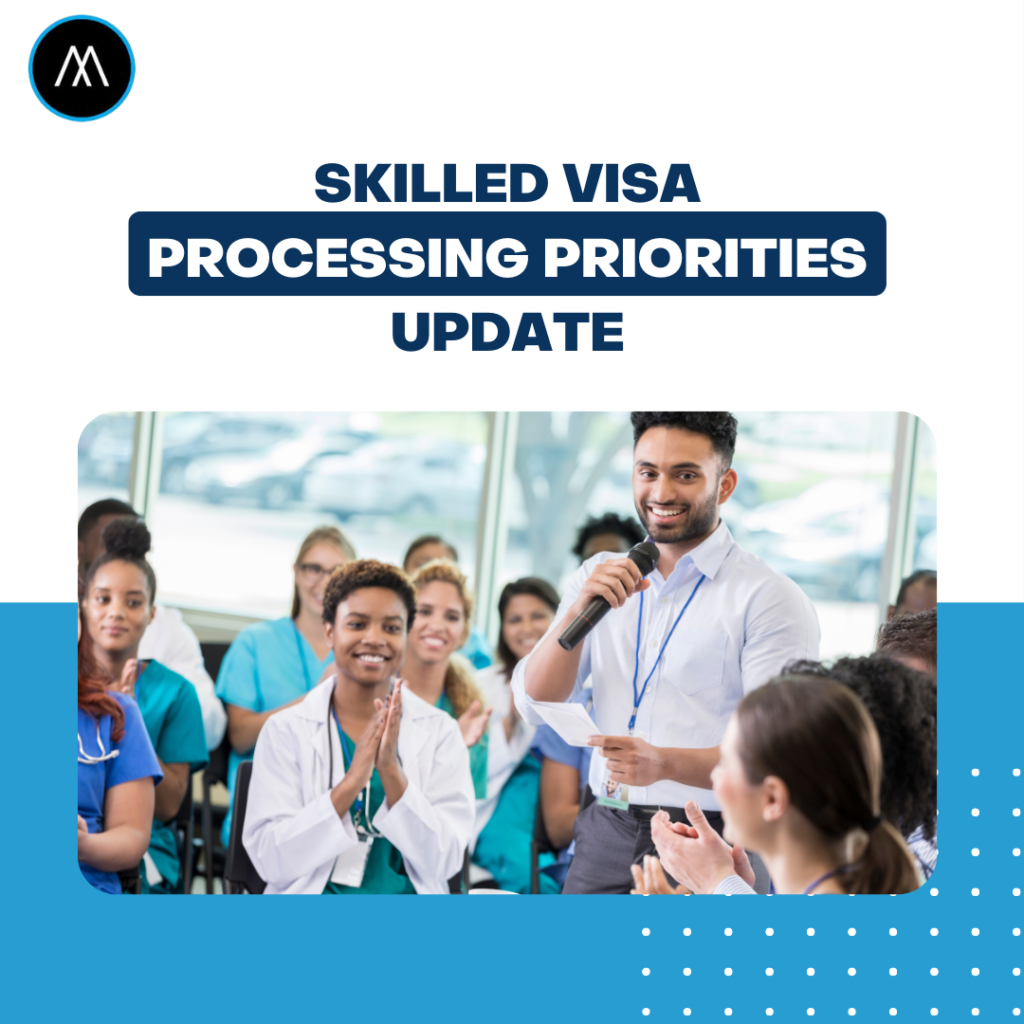A new Ministerial Direction No. 100, introduced by the Hon. Clare O’Neil, Minister of Home Affairs, is presently in effect and sets forth the Order of Consideration for specific Skilled visas by the relevant Australian authorities, including the Department of Home Affairs.
The old Ministerial Directions No. 96 and 97, which dealt with the hierarchy of factors to be taken into account when evaluating skilled visas, have been repealed.
Prior Ministerial Directions No. 96 and 97 made reference to the Priority Migration Skilled Occupation List (PMSOL), however, the new Ministerial Direction No. 100 makes no mention of the PMSOL.
It is significant to note that the new Ministerial Direction No. 100 applies to the nomination and visa applications submitted before, on, or after the Direction’s effective date and whose status has not yet been established.
Skilled visa processing priorities
Applications for skilled visas are processed in accordance with Ministerial Direction No. 100’s list of government policy priorities.
Ministerial Direction No. 100 applies to the following types of skilled visas:
- Subclass 124 (Distinguished Talent)
- Subclass 186 (Employer Nomination Scheme)
- Subclass 187 (Regional Sponsored Migration Scheme)
- Subclass 188 (Business Innovation and Investment) (Provisional)
- Subclass 189 (Skilled – Independent)
- Subclass 190 (Skilled – Nominated)
- Subclass 191 (Permanent Residence (Skilled Regional))
- Subclass 457 (Temporary Work (Skilled))
- Subclass 482 (Temporary Skill Shortage)
- Subclass 489 (Skilled – Regional (Provisional))
- Subclass 491 (Skilled Work Regional (Provisional))
- Subclass 494 (Employer Sponsored Regional (Provisional))
- Subclass 858 (Global Talent)
- Subclass 887 (Skilled – Regional)
- Subclass 888 (Business Innovation and Investment (Permanent)
Priority is given to the following applications for skilled visas:
- Visa applications in relation to a healthcare or teaching occupation.
- For employer-sponsored visas, visa applications where the applicant is nominated by an Approved sponsor with Accredited Status.
- Visa applications in relation to an occupation are to be carried out in a designated regional area.
- For permanent and provisional visa subclasses, visa applications that count towards the migration program, excluding the Subclass 188 (Business Innovation and Investment (Provisional)) visa.
- All other visa applications.
Priority is given to visa applications if the primary applicant is outside of Australia at the time of the application for both provisional and permanent skilled visas under each of the aforementioned categories and those who are eligible passport holders.
Healthcare or Teaching Occupations
ANZSCO Sub-major Group 25 – Health Professionals
ANZSCO Minor Group 241 – School Teachers
ANZSCO Minor Group 411 – Health and Welfare Support Workers
ANZSCO Unit Group 1341 – Child Care Centre Managers
ANZSCO Unit Group 2346 – Medical Scientists
ANZSCO Unit Group 2721 – Counsellors
ANZSCO Unit Group 2723 – Psychologists
ANZSCO Unit Group 2725 – Social Workers
ANZSCO Unit Group 3112 – Medical Technicians
ANZSCO occupations:
134311 – School Principal
421111 – Child Care Worker
423111 – Aged or Disabled Carer
423312 – Nursing Support Worker
423313 – Personal Care Assistant.
Processing priorities for other skilled visa applications
Applications for all other skilled visas are evaluated in order of date of lodgement.
What we can take from all of this is that offshore applications have been given priority to allow Australia to manage its very clear labour shortage.
We’re a team of Australian Migration Specialists who advise daily on visa applications and pathways to residency. Are you unsure of how to proceed? Visit our home page and make sure you book a consultation where we can answer any questions you might have directly relevant to your situation.
Please note that the above information is general and not exhaustive or specific to your case. We always advise that you first speak to a migration agent or lawyer before making any migration-related decision.

